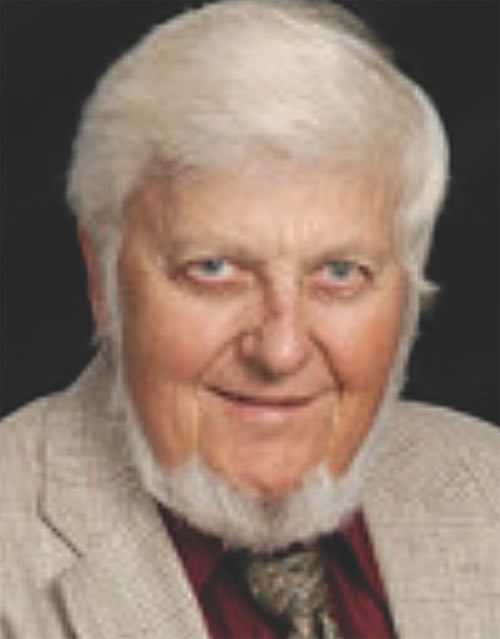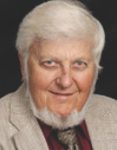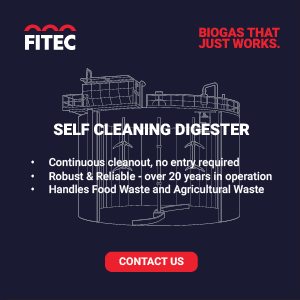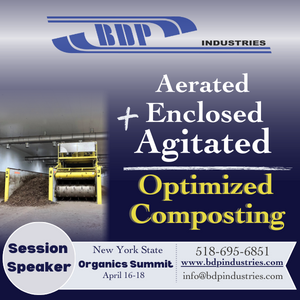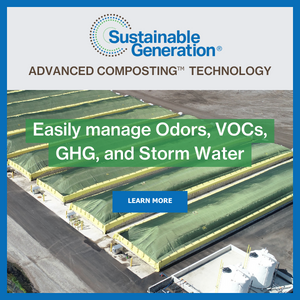BioCycle September 2018
Francis R. Gouin, Composting Researcher And Advocate 1938-2018
Dr. Francis Gouin, retired Professor Emeritus at the University of Maryland, passed away in early August. Dr. Gouin’s distinguished career at the University of Maryland included horticultural research, and involvement in the agricultural extension service. He was respected by the nursery industry for his practical solutions to complex problems. However, many of us knew Dr. Gouin because he was a tireless researcher in compost usage, as well as other recycled organics. His research focused primarily in nursery production, and he was among the original biosolids composting researchers at the USDA Beltsville Research Lab in the early 1970s.Dr. Gouin was also active in the early days of the US Composting Council (USCC), and was a strong advocate for product standards, and the Seal of Testing Assurance Program. The USCC awarded him the Rufus Chaney Award for Excellence in Research and the Hi Kellogg Award for his contribution to the U.S. composting industry.
I knew Dr. Gouin since 1984, when he assisted the compost brokerage business that I worked for. After his retirement from the university, Dr. Gouin operated a small production scale farm, which really functioned as a horticultural research farm. It amazed me to see his vigor and divergent interests even late in his life. I was not surprised that his farm workshop housed wood working equipment, but I was amazed to see the canoe that he had built, as well as a guitar! Then, on one occasion, after showing me the float that he had constructed (with some help) for a 4th of July Parade, he showed me the Model T Ford that he restored and had running. While taking a spin in the Ford with him a year or two ago, we talked about his early life and I found out that he was primed to be a medical doctor, even working as a doctor’s assistant when he was young.
I was fortunate to have known Frank Gouin for so many years, but even more so for the time I spent with him over the past 5 years. I would come home from seeing him and try to explain to my family how incredibly mentally and physically active he was. Then I finally put my finger on it; I realized that he was truly a renaissance man. He was talented at so many things, and was also socially minded and active. Dr. Gouin was always willing to help, and that is why he will be missed by his family and community, as well as the nursery and composting industries.
What an example you are for us, Frank. Rest in peace. You will be missed. — Ron Alexander, R. Alexander Associates
Community Recycling IQ
The Massachusetts Department of Environmental Protection and The Recycling Partnership developed a curbside and a drop-off toolkit to help communities address contamination in their recycling streams. The Recycling IQ (Improve Quality) Kit provides steps, tools and resources to help Improve the Quality of local recycling programs. Included are: Guidance for engaging with the materials recycling facility (MRF) and hauler; Instructions and tools for targeting messages; Tools for tracking and reporting results; Customizable artwork for education and outreach; and Resources for direct feedback at curbside or drop-off. The Recycling IQ Kit is open source and available for any city or town to use at any time.
Step One in the IQ process involves completing a 3-page questionnaire that assesses “your state of readiness to fight contamination in your recycling stream” using the tool to “make sure your community is ready to take on this challenge. Before starting this project you’ll need to assess your budget, present your case to decision makers, and get buy-in from your city/town officials, your hauler and your MRF.” Download the curbside and drop-off toolkits.
Estimating On-Farm Food Loss At The Field Level
A team of North Carolina State University researchers conducted an in-field evaluation of crop losses on 13 fields of vegetable crops grown on a 121-hectare (300 acres) North Carolina farm in 2016. The farm produces cabbage, summer squash, long green cucumber, green bell pepper, and eggplant. An assortment of vegetable grades corresponding to USDA grades and pack styles from the farm are sold to retailers, foodservice distributors, and through produce brokers along the U.S. East Coast. “Marketable quality,” according to USDA grades, refers to vegetables displaying maturity and appearance quality that meets buyers’ current quality specifications. Unmarketable but edible refers to vegetables that are of optimum maturity, but do not meet desired quality specifications for size, shape, or surface blemishes. Inedible quality refers to vegetables displaying visibly diseased, decayed, or sun-scalded areas, that are over-mature, or have physical damage.
Growers often discontinue a harvest due to a perception of poor quality of produce remaining in the field. By collecting the entirety of the crop remaining and quantifying it according to the three categories of quality, a definitive assessment of how much of the field has succumbed to quality issues can be determined. In this study, the focus was on determining how much food remained in the field that was in condition suitable for human consumption, whether it would be directed by the grower into an alternative market or donated into the emergency food system.
Each field assessment results were expressed as a percentage of the remaining crop in the categories marketable, edible, or inedible quality. The marketable portion of what was left behind in each field averaged 24.37 percent. The unmarketable but edible portion averaged 41.45 percent, and the inedible portion averaged 34.18 percent. Ten fields out of the 13 evaluated contained marketable produce equivalent to greater than 10 percent of the grower’s reported yield. All of the fields evaluated contained produce that was considered edible but would not meet buyers’ specifications, representing amounts greater than the harvested and marketed yield. Seven fields contained edible produce in estimated amounts greater than 20 percent of the grower’s reported yield.
Field evaluations for this case study have shown that the amount of marketable food remaining in the field can be high in comparison to the marketed amount, which could provide an opportunity for growers to further profit from the crop they are already cultivating.
Food Manufacturer’s Zero Waste Pledge
Pacific Foods, based in Tualatin, Oregon, manufactures soups, nondairy beverages, broths and stocks that are sourced sustainably. Ten years ago, it began a program to reduce the amount of waste going to landfill. Recently, the company announced its intention to reach zero waste by 2021.
Currently, 86 percent of Pacific’s waste is either recycled or repurposed, according to the company. Initiatives on the road to zero waste include:
• Creating an onsite recycling center to help divert more than 500 tons/month of material. Pacific Foods’ employees can bring in tough-to-recycle items, e.g. electronics, to be disposed of safely and responsibly
• Wastewater solids and fats are sent to anaerobic digestion facilities, where the biogas is combusted to generate electricity
• 100 percent of food scraps are converted into animal feed or compost
• Hundreds of thousands of pounds of okara, a by-product of crushing soybeans for nondairy beverages, are made into high-protein animal feed annually.
New Technical Policy For Measuring Recycling
The Solid Waste Association of North America’s (SWANA) International Board unanimously approved a new technical policy citing the need for entities to measure recycling progress and encouraging the development of a consistent methodology.
Although the historic measure for recycling has been weight-based, SWANA is encouraging the ongoing evaluation of different metrics, to gain a holistic and better view of the domestic recycling process, according to a SWANA press release. “As organizations throughout the U.S. begin utilizing the identified weight-based standard within the new technical policy, staff members will be able to review and determine how their programs compare to others at a clear and concise baseline starting point,” said Robert Smouse, Assistant Director of Solid Waste for the City of Fort Worth, Texas and current Director of SWANA’s Planning and Management Technical Division. “In addition, organizations can convert and interpret their recycling weights into additional beneficial attributes, such as economic influences, environment contributions, greenhouse gas generation, lifecycle impacts and energy comparisons.”
With increased quality requirements for recyclables in the wake of China’s waste import restrictions, some material in a limited number of states is temporarily being disposed in landfills. This is leading many industry leaders to take a fresh look at local recycling programs and requirements, including measurement. T-6.4 SWANA Technical Policy on Measuring Recycling


